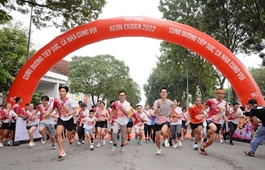Mekong Delta seeks to develop agriculture-related tourism
Mekong Delta seeks to develop agriculture-related tourism
Agriculture and agri-tourism are key to the development of the Mekong Delta, experts have said.

Speaking at a workshop in Can Tho City late last week, Nguyen Van Hong, deputy chairman of the city People's Committee, said the delta is a key agricultural area of the country, accounting for 32 per cent of the sector’s output and enabling food security and exports.
It accounts for 50 per cent or more of the country’s rice, aquaculture and fruit production, 95 per cent of rice exports and 60 per cent of fish exports.
Besides, it has been favoured by nature with a network of rivers and canals running more than 28,000km, a diverse range of eco-systems comprising the sea, islands – both in the sea and rivers – national parks, coastal mangrove forests, and unique wetlands, he said.
The rich combination of nature and culture enables the region to develop a variety of tourism types, with agri-tourism having the greatest potential, he said.
But the average income in the delta is still low, especially for farmers since the agricultural products are mainly simple products, the product packaging has not attracted tourists, post-harvest losses are high, and tourism remains underdeveloped and lacks variety, he said.
For years now farmers there have developed agri-tourism models that not only increase their incomes but also the sustainability of agriculture and rural development.
According to the city Department of Tourism, the number of tourists seeking hands-on experiences has increased sharply in recent years.
Across the region, investment is pouring into agri-tourism.
Tran Muoi, owner of the Lang Que Fruit Garden in Can Tho’s Chau Thanh District, said he grows star apple, mango, rambutan, coconut, and guava on an area covering 2.8ha.
His orchard opened to visitors in 2015. Entry costs only VND25,000 (US$1.1) and visitors can pick fruits to eat and relax.
“Visitors usually buy more fruits to take home,” he said.
Richard Warter, an American tourist, said he saw fruits that are not available in his country.
“This place was very interesting to visit. I’m going to visit rice fields to understand how farmers grow rice.”
Muoi earns around VND400 million ($17,250) a year, with tourism accounting for 70 per cent of that.
He used to sell all his fruits to traders at cheaper rates, but now he sells 70 per cent to visitors.
The orchard gets 130-150 domestic and foreign visitors daily, and 200 during weekends and holidays.
Popular traditional foods are cooked on demand and served along with drinks.
Muoi also plans a homestay in the near future to meet a growing demand.
Earlier this year the Government announced plans to develop agricultural hubs in the delta with specialised farming zones and urban areas.
The hubs will include one each in Hau Giang and Dong Thap provinces for freshwater aquatic creatures, fruits and rice, in Kien Giang, Ca Mau and Soc Trang for coastal seafood production, and in Tien Giang and Ben Tre for fruits and crops.
The plans also include developing Phu Quoc Island in Kien Giang Province into a eco-tourism and services hub with linkages with major economic centres around the world.
The delta will get priority in development of socio-economic infrastructure, including to adapt to climate change and for the development of modern, smart information technology infrastructure, and developing economic corridors.
The resolution targets annual average growth rate of 6.5-7 per cent for the delta from now to 2030.






















